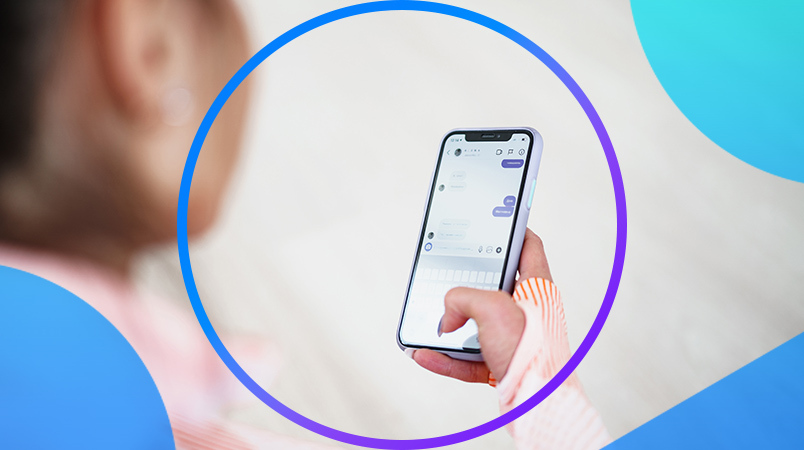1. FAQ Chatbot
An FAQ (frequently asked questions) chatbot can be used to automate answers to some of the more common questions your organisation may be asked. These types of questions can be a huge drain on your customer service team and often involve repetitive, copy-and-paste answers that are more easily and efficiently managed by a machine.
FAQ chatbots are effective because they allow customers to get rapid access to the information they need without having to scroll through pages and pages of FAQs. Not only do they allow customers to self-serve and access answers to their questions without the need for human interaction, but they also mean you can offer 24/7 customer service without the need to increase your staffing overheads.
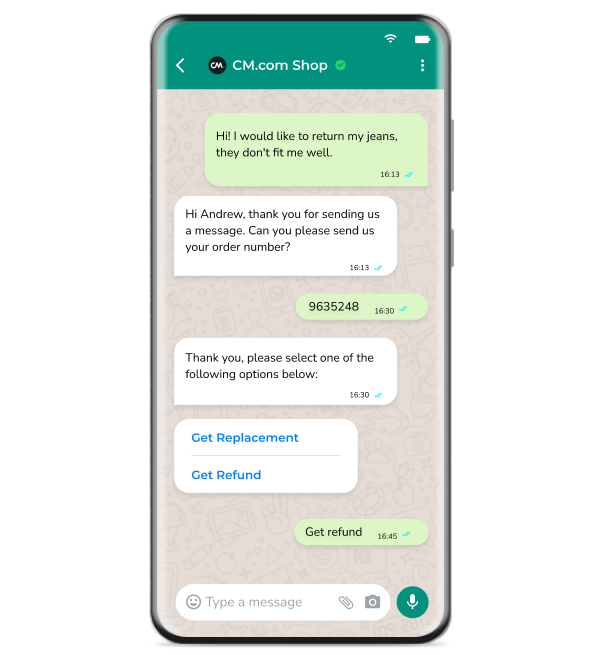
Chatbots answering FAQs can take the form of either an AI or a scripted chatbot, although scripted chatbots are more common in customer support and marketing settings. Scripted bots can carry out simple conversations with customers based on a predefined script. When a user sends a customer service query, the bot can reply with a predefined answer based on its script programming. As with other types of chatbots, the FAQ variant can escalate a query to a human agent if it’s unable to resolve it to the customer’s satisfaction.
With more advanced AI chatbot technology, you can create a Dynamic FAQ Module, where new FAQs are shown dynamically, with the best possible answer available. As a bot, it can determine the answers to more complex questions based on the format of the question and information held within your organisation. For example, customers can ask the question in any form, and the bot will search for the best answer in every database connected (whether this is the website, your catalogue, or previously asked questions). It can recognise questions based on entities and intent.
Benefits of a FAQ Chatbot
FAQ chatbots save customers valuable time, ensuring they’re not on hold for hours on end or spending large chunks of their day trawling through reams of FAQ pages. Allowing your customers to self-serve has two major benefits:
It means your customer service team can focus on providing quality customer care, rather than dealing with repetitive queries which means they can take time off out of hours.
Customers can get the information they need with minimal effort and without needing to speak to a customer service agent, which some people can find intimidating.
Types of FAQ Chatbots
WISMO Chatbots
WISMO (Where Is My Order) chatbots are a variety of FAQ chatbots in their own right. While parcel tracking is well-established, customers often default back to the organisation they purchased from to find out where their orders are, due in part to organisations such as Amazon controlling their own logistics. WISMO chatbots can locate specific orders and reply in real-time with tracking details scraped from the tracking tool of your logistics provider.
Returns Chatbots
Another specific chatbot use case is to automate the returns process, which can cause headaches for your customer service team. Your returns policy and the process will generally be well-established and therefore ripe for automation. Detailing the ways in which products should be packaged, identified, and creating returns labels are ideal applications for a chatbot and will allow your customer service team to focus on bigger issues.
FAQ Chatbot Use Case: Missguided
Our customer Missguided experienced a period of rapid growth and used a chatbot to automate areas of their customer service that were under increased pressure, including creating an easy-to-use FAQ chatbot. The chatbot resulted in a 14% reduction in contacts and associated costs and allowed the customer service team to be more proactive and focus on creating high-quality positive customer interactions while the chatbot handled repetitive tasks.

Missguided’s FAQ chatbot resulted in:
80% of engagements now happen via a chatbot
14% reduction in contacts and the associated costs
8 weeks to complete the project
2. Verification Chatbot
Verification chatbots are a simple and secure way to verify the identity of customers, allowing them to access and update their information online without the need to contact customer service teams directly. These verification chatbots allow customers to correct payment or contact information in a secure way, guarding against fraudulent access.
These types of bots can make life easier for your customer service team. If, for example, you need to verify a customer’s identity before connecting them to a live agent in order to discuss sensitive details of their account, a verification chatbot can provide a layer of security without requiring customer services to go through the time-intensive task of asking a series of security questions.
Verification chatbots are particularly useful where financial information needs to be disclosed. For example, to update payment details for standing orders, to correct financial information, or to apply for a financial product online. By utilising technologies such as Two-Factor Authentication (2FA) your chatbot can securely identify customers using their mobile numbers. It’s simple to use: a customer is sent a code via SMS or voice – potentially after asking a security question for an added layer of protection – and is then asked to enter the code into the chatbot to verify their identity.
Benefits of a Verification Chatbot
Chatbots focusing on verification provide organisations and customers with a secure way of self-service.
Customers can share sensitive information without human interference. Many people prefer this and provide more honest answers to a machine
Customers can update their details in a secure way
Organisations can quickly verify customers, saving customer service agents time
Verification Chatbot Use Case: Coca Cola
Coca-Cola ran a global competition where customers could scan codes on products to enter a prize draw. Given differing rules in numerous territories, Coca-Cola needed to ensure they were compliant and used a chatbot to ensure players were eligible. The chatbot helped them overcome three challenges: instant feedback, authentication, and system abuse.

Removing barriers to entry is the key to large-scale engagement, so Coca-Cola wanted to keep the rules simple but enforceable. Our WhatsApp chatbot ensured the game remained enjoyable but operated within a system that was resistant to abuse. These rules were there for age verification, and to ensure players couldn’t game the system: no entering random codes, or the same winning codes on multiple devices.
3. Customer Service AI Chatbot
Automating the process of responding to customer service questions allows your team to use their time more effectively to deliver a better and more consistent experience for your customers. The customer service chatbot can automatically respond to different queries and even use connected databases to find the answer to more complex questions. With the right data, the bot can be very personal. It can adapt the answers based on known customer data and even make recommendations based on their preferences.
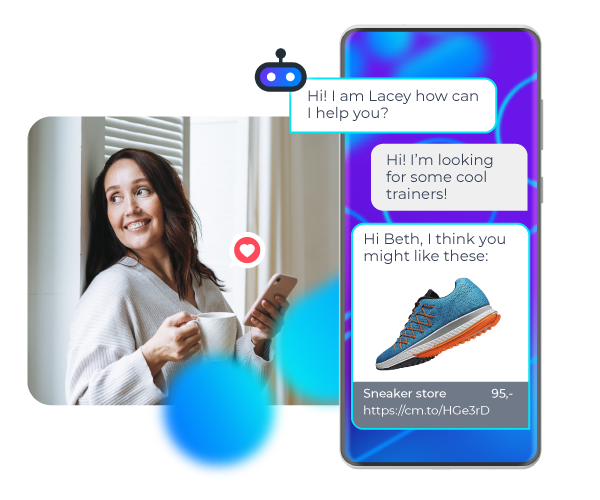
Additionally, advanced AI chatbots combine machine learning and Natural Language Processing (NLP) and operate on context, not just keywords. That means your chatbot can deduce intent from responses, making it seem as if the customer is speaking to a human and providing exceptional customer service.
Analytics help to understand your customers even better, enabling you to optimise the bot continuously. Many organisations start off their automation journey with certain topics in mind, but once they go live, the data shows the customers actually ask completely different questions. These insights help optimise not only the bot but also the live service.
Benefits of a Customer Service Chatbot
If implemented correctly, a customer service chatbot can save you a lot of time and money. The most important benefits include:
24/7 support for your customers without any waiting times
Faster issue resolution – even if there’s a handover, agents will be armed with more data already.
Customer Service Chatbot Use Case: DHL Parcel Benelux
DHL Parcel Benelux uses our Conversational AI Cloud solution to provide parcel delivery updates to senders and recipients, for businesses and consumers. DHL’s solution is connected to all relevant databases, using real-time data to give the best customer-specific answer.
 The AI-driven bot can intelligently deduce intent from customer questions before formulating an answer and is capable of handing customers over to live chat where appropriate. Chatbot Tracy shows the importance of balancing personal contact and automation.
The AI-driven bot can intelligently deduce intent from customer questions before formulating an answer and is capable of handing customers over to live chat where appropriate. Chatbot Tracy shows the importance of balancing personal contact and automation.
A bot gives support, it can answer quickly and easily. A human can do much more: show emotions, think outside the box, and act outside processes. I think humans always need human contact. - Natasja Wientjes, Customer Service Director DHL Parcel Benelux
4. Internal Knowledge Base Chatbot
An internal knowledge base chatbot allows you to hold a vast amount of internal company information in one place. Not only for your customer service team to access but for the entire company. This dynamic database can be updated by product experts and customer service agents to always have the best possible answers available. This single source of truth is oftentimes based on the input of your customer-facing chatbot and will be optimised continuously.
One of the prime benefits of an internal knowledge base chatbot is that it can fast-track new employee training and allow new starters to become more effective more quickly. The knock-on effect of that is it frees up more experienced staff to focus on quality customer care rather than line management and training.

But internal knowledge bases are not only for new starters - experienced colleagues can benefit from the depth of information they provide. It’s virtually impossible for one employee to hold all of the information at all times that they need to do their job, so an internal chatbot is a useful reference tool.
Knowledge leaving your business is also a concern, particularly in high-churn environments such as customer service. A dynamic internal knowledge base solves the issue of knowledge retention by keeping vital information at the fingertips of all team members.
Benefits of an Internal Knowledge Base Chatbot
A knowledge base chatbot can support employees in ways humans can’t, giving them the information they need to do their job effectively from day one.
Boost efficiency for new starters and experienced employees
Empowers teams to find correct responses fast
More consistent, unified customer experiences
How do you use an Internal Knowledge Base Chatbot?
There are many areas of your business that could benefit from an internal knowledge base chatbot. Here are just a few:
Internal Processes
Sometimes the chatbot functionality is smarter than some internal systems. A dynamic internal knowledge base can improve legacy systems. Use it as one single source of truth to break down silos. Improve your employee experience while improving customer experience. Every employee can look for an answer, check if it’s correct, and get instructed on how to use this in their work – all from one system. This leads to the best answer, in any situation.
Customer Service
Looking up data in multiple systems is history – you can find everything in your knowledge base. Make sure your company starts working and updating the content in the knowledge base, and then your agents and the bot will always have the best answer available. Both use the same data, leading to a more consistent, unified customer experience.
Cross-functional Collaboration
A dynamic knowledge base is not just for knowledge sharing, it can also improve cross-team collaboration. Give employees across departments one location to find, share, and update information. This will improve the visibility of what other teams are doing, leading to better understanding, greater collaboration, and new perspectives.
Internal Knowledge Base Chatbot Use Case: Northern Ireland Water
In 2019, Northern Ireland Water began using a customer service chatbot to deal with the high volume of customer service queries it receives each day. With that running smoothly, at the tail end of 2020, NI Water’s partner IPI turned its attention to internal communication; specifically how NI Water’s customer service agents handle enquiries. The existing solution was cumbersome, and updates could take up to three months to be processed. Our solution was to work with IPI and NI Water to build an internal knowledge base chatbot that could be updated simply and quickly and would give the customer service team a script to deal with queries, alongside the information they’d need to manage customer responses.
NI Water’s internal chatbot resulted in:
2,500-3,000 interactions per week by agents
Account handling time has been reduced by 11 seconds per call
More user-friendly than the previous solution and quicker for agents to get to the information they need
5. Live Event Chatbot
A live event chatbot allows customers to get quick answers to their questions before, during, and after a live event. Live event chatbots can respond quickly and easily to all sorts of questions visitors ask about live events, giving agents more time to respond to complex questions or issues.
As well as automatically responding to frequently asked questions, an AI-powered chatbot can understand the context and recall detailed information in order to answer broader questions, creating a more conversational experience for consumers. It can use real-time data to give the best, personal responses – such as directing visitors to the stage where their favourite artist will perform, or to the toilets without queues.
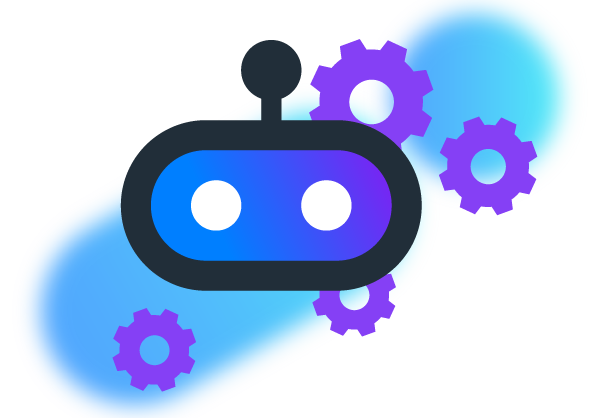 The chatbot can deal with the whole experience, only handing it off to customer service agents when a query is escalated to a level the chatbot can no longer manage or when the customer requests human support.
The chatbot can deal with the whole experience, only handing it off to customer service agents when a query is escalated to a level the chatbot can no longer manage or when the customer requests human support.
Event chatbots can have multiple purposes. Use it for customer service, purely informational, or enhance the event experience with added entertainment. Create a consistent experience across marketing, service and sales.
Benefits of a Live Event Chatbot
A chatbot can surprise your visitors before, during, and after the event; offering exclusive content, deals, entertainment, or notifications to make sure you get all the must-sees at the event. A chatbot can also save you and your visitors a lot of time. With personalised conversations, you can support your visitors and gather instant feedback – without having to wait for the event to wrap up.
An enhanced experience benefits your event in the long term, creating positive sentiment and encouraging your visitors to buy tickets again.
Save time, effort, and resources. A chatbot helps visitors, taking work off your hands.
Live Event Chatbot Use Case: Formula 1 Heineken Dutch Grand Prix
We worked with the Formula 1 Heineken Dutch Grand Prix to create the Race Engineer chatbot. Fans could use the Race Engineer via WhatsApp to ask questions about travel to and from the event, tickets and to receive a variety of exclusive content.
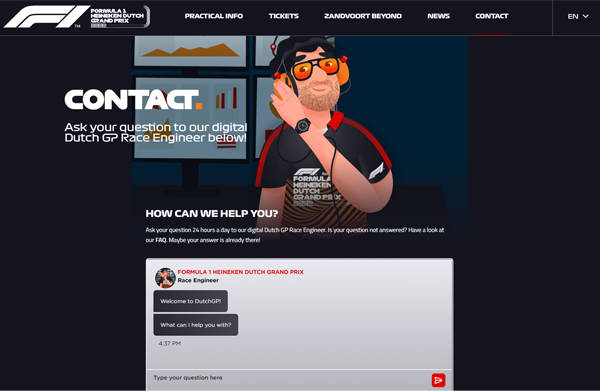 The Race Engineer can support you from behind his onboard radio, start a quiz, share behind-the-scenes videos, and more. Fans could start a conversation anytime, anywhere; even during the race. If the bot couldn’t answer a question, the conversation could automatically be handed over to a customer service representative on live chat via Mobile Service Cloud.
The Race Engineer can support you from behind his onboard radio, start a quiz, share behind-the-scenes videos, and more. Fans could start a conversation anytime, anywhere; even during the race. If the bot couldn’t answer a question, the conversation could automatically be handed over to a customer service representative on live chat via Mobile Service Cloud.
6. Voicebot
A voicebot is a conversational agent that uses artificial intelligence and natural language understanding (NLU) to interpret the intent and meaning in the speech of its conversational partner. This technology is often also referred to as ‘Conversational IVR’ (Conversational Interactive Voice Response).
In simple terms, Conversational IVR allows callers to engage with a self-service solution with their voice – using everyday language. A voicebot can understand full sentences and context. It will reply in full sentences, allowing callers to lead the conversation.
In contrast to traditional IVR, there is no static menu, and callers don’t have to dial-in numbers. Conversational IVR offers a faster, smoother, and more personal experience for customers. You can speak to the bot like you would speak to a human agent.
As with previous types of chatbots, should the conversation move into complex territory that requires a human agent to respond, the voicebot can route the query to the correct agent in order to facilitate a satisfactory response
Benefits of a Voicebot
The “I want it all, and I want it now” sentiment shows no signs of abating. In fact, 98% of customers admit that calling a service centre takes too long and they will actively source a quicker approach. Voicebots do that, being able to simultaneously handle multiple requests that all but eliminate hold times. Not only is there no waiting time; a voicebot can offer 24/7 support.
No waiting times; 24/7 support via phone
Save time and resources. The bot will help reduce the number of calls between customers and live agents.
How do you use a Voicebot?
Your voicebot is a brilliant conversational tool that allows your customers to find out more about your business. Here are just some of the things it can do:
Update customer information
A voicebot is the perfect assistant to help your customers update vital information without having to speak to a human customer service agent. Better still, there’s no annoying wait for your call to be answered. Easily change an address, delivery time or make an appointment.
Find company information
Your voicebot is a useful tool for customers to find out important information about your business, from opening hours to important email and street addresses, your voicebot can ensure customers are well-informed and enjoy a slick, seamless customer experience at all times.
Check the status of an order
A voicebot can give quick, efficient updates to customers wanting to know where their orders are, saving your customer service team valuable time and providing a much more efficient way to get order tracking information. When connected to the right systems, your voicebot can change delivery times, and addresses, or cancel the order.
Voicebot Use Case: VIVID
Housing association VIVID uses our Conversational AI Cloud solution to power its voicebot that allows customers to find concise answers to their questions. The upshot of this is that their customer service agents have more time to deal with complex customer queries, allowing VIVID to offer 24/7 customer service.
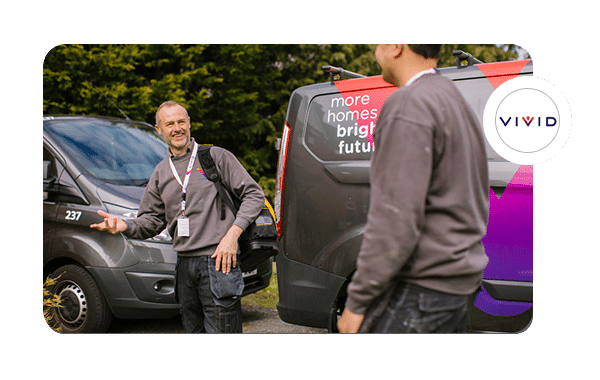 You can call VIVID out of hours and self-serve using the voicebot. Equally, if you call during office hours, you can opt to speak to the voicebot rather than a human. The ability to offer 24/7 customer service has revolutionised VIVID’s customer service experience.
You can call VIVID out of hours and self-serve using the voicebot. Equally, if you call during office hours, you can opt to speak to the voicebot rather than a human. The ability to offer 24/7 customer service has revolutionised VIVID’s customer service experience.
The support from CM.com has been amazing. We’ve felt like we have a hotline to whoever it is we need to speak to in order to get things moving. - Chantal Mitchell, Customer Experience Manager VIVID
Conclusion
Getting the balance right between human and software interaction is key to delivering effective hybrid customer service and giving customers the opportunity to self-serve as well as having the option to contact a human agent to deal with more complex issues.
Customers expect your customer service team to operate around the clock and, while your human team may have something to say about the idea of 24/7 working, a Conversational AI solution is ideally placed to deliver customer service non-stop at whichever level of complexity you feel is appropriate for your organisation. A voicebot can also handle a huge number of incoming queries without adding additional overhead.
Finally, from a human perspective, allowing your customer service team to focus on the quality and not the quantity of your customer service gives them a more fulfilling work experience, improving productivity and morale throughout the team.
We’re sure there’s a type of chatbot to add value to your business. Whether it’s an internal knowledge, a basic WISMO bot, or an entertaining event chatbot; you can build it easily yourself. CM.com offers multiple chatbot solutions to create any type of bot - always with a personal touch.








